Diplomatic Bluebook 2022
Opening Special Feature
The Fight Against the Novel Coronavirus Disease (COVID-19) in 2021
2 Initiatives of the Government of Japan, Including MOFA
1. Vaccination and Repatriation Support for Japanese Nationals Residing Overseas
As COVID-19 Vaccination proceeded in various countries, the Government of Japan made it possible for Japanese nationals residing overseas who have concerns about local vaccination for various reasons to receive vaccinations in Japan.
In July 2021, it became possible for employees of Japanese companies and organizations residing overseas to get vaccinated at workplace vaccination sites in Japan.
In addition, in August, the Government of Japan began a program to provide the opportunity for Japanese nationals residing overseas to be vaccinated at Haneda and Narita airports.
In light of the increasing use of vaccination certificates around the world and the increasing number of situations in which such certificates are required, such as when traveling or using facilities in countries and regions of stay, this program provides the opportunity for users to receive a vaccination certificate at the venue after their second dose. This system was maintained for the purpose of making Japanese nationals residing overseas smoothly engage in economic and social activities in their countries and regions of residence.
A total of approximately 35,000 doses were administered and approximately 18,000 vaccination certificates were issued (as of the end of February 2022).
Furthermore, MOFA provided repatriation support for Japanese nationals overseas, taking into consideration the domestic situations, including the infection conditions and security situations in each country.
The Embassy and Consulates-general of Japan in India recommended that Japanese nationals residing in India return to Japan temporarily in response to the rapid increase in the number of people infected with the Delta variant in India in May. They also responded by providing information on testing organizations where PCR tests could be taken, and establishing a PCR test site exclusively for Japanese nationals in order to enable smooth departure from the country by Japanese nationals who wished to leave.
In addition, the Embassy of Japan in Indonesia supported the repatriation of Japanese nationals residing there by operating special flights by Japanese airlines as there was an increase in the number of Japanese nationals who wished to return to Japan due to the rapid spread of COVID-19 during July and August. A total of nine special flights were operated by Japanese airlines, enabling approximately 1,000 Japanese nationals to return to Japan.
India: Solidarity Between Japanese Diplomatic Missions and the Japanese Community
The key to overcoming the crisis in India, the first country to be affected by the Delta variant, was the solidarity fostered amidst the spread of COVID-19 between the Japanese Embassy and Consulates-general (diplomatic missions), and the Japanese community.
COVID-19 infections in India surged due to the Delta variant in May 2021. There were more than 400,000 new cases per day, hospital beds across the country were filled, and images of patients fighting for oxygen cylinders were broadcast in the media. Immediately after the outbreak of COVID-19, not only international but also domestic flights were suspended, and there was an urgent need to secure return routes for approximately 10,000 Japanese nationals residing in India. Amidst this situation, the Embassy of Japan in India worked together with Japanese airlines to operate special flights. The Embassy also obtained approval from the Government of India and dispatched personnel across province boundaries to support passage through India to enable Japanese nationals to successively travel to the airport in Delhi by land routes from other regions. Japanese airlines also took various infection control measures and continued to operate special flights. We are very grateful for the response of these Japanese airlines.
Based on the cooperation with the Japanese community cultivated through these efforts, the Embassy and Consulates-General established a system for sharing information on the infection conditions with Japanese medical service companies, and provided information on the medical care system in India (such as the situation of empty hospital beds) to Japanese nationals residing in India on a regular basis.
In addition, due to the insufficiencies of PCR test organizations in India, the Japan Chamber of Commerce and Industry in India started a PCR test program for Japanese nationals who were unable to receive testing when returning to Japan, and the Embassy provided support for this program. Furthermore, in order to prevent serious illness among Japanese nationals, the Embassy and Consulates-General worked to monitor the infection conditions of Japanese nationals in real time, and Embassy medical officers cooperated with hospitals and Japanese medical service companies to treat Japanese nationals who were hospitalized.
All of these efforts were made possible through cooperation between the Japanese community and the diplomatic missions.
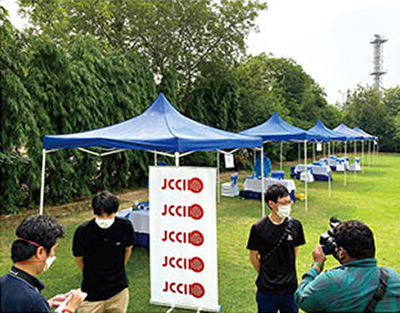
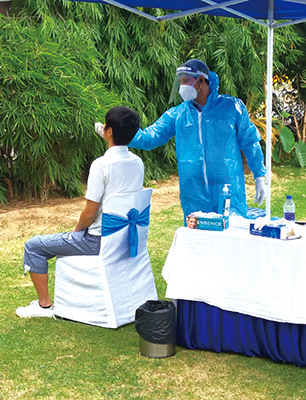 PCR test site (Photo: Japan Chamber of Commerce and Industry in India)
PCR test site (Photo: Japan Chamber of Commerce and Industry in India)2. Support to Developing Countries
The global spread of COVID-19 threatens the lives, livelihoods, and dignity of people in developing countries with weak health and medical systems, and has become a human security crisis. In addition, the stagnation of global economic activities resulting from COVID-19 has also been a major blow to developing countries with vulnerable economic foundations. Providing support to developing countries in crisis is an issue that the international community as a whole should unite to address. Japan is providing support to developing countries by providing vaccines, strengthening health and medical systems, and maintaining, revitalizing, and increasing the resilience of economic activities.
Efforts to Ensure Equitable Access to Vaccines
“No one is safe until everyone is safe” (G7 Foreign and Development Ministers' Equitable Access and Collaboration Statement (May 5, 2021, London)
Even if COVID-19 is contained in certain countries or regions, if it is still raging in other countries or regions, there is a risk of resurgence in the countries or regions where it should have been contained, coupled with outbreaks of variants. Therefore, in order to contain COVID-19, it is important to promote equitable access to and distribution of vaccines and other tools throughout the world, and international cooperation and collaboration are needed for this purpose.
In order to ensure equitable access to safe, effective, and quality-assured vaccines throughout the world, Japan has made various contributions to the COVAX Facility(Note 1) since its establishment, including cooperation for designing its mechanism, financial contributions, and vaccine donations.
In June 2021, Japan co-hosted the COVAX AMC Summit (Advance Market Commitment Summit) with Gavi(Note 2) in a virtual format. As a result of Prime Minister Suga's call for further solidarity and commitments from the international community in the fight against COVID-19, many additional financial contributions from governments and the private sector were announced, and the COVAX Facility secured $9.6 billion, far exceeding its fundraising target ($8.3 billion) needed to secure 1.8 billion doses of vaccines (enough to vaccinate 30% of the population of developing economies) by the end of 2021. At the Summit, Japan announced an additional contribution of $800 million to the COVAX Facility, which together with its previously disbursed contribution of $200 million brought its total financial contribution to $1 billion. Japan also announced that it would provide around 30 million doses of vaccines manufactured in Japan to various countries and regions including through the COVAX Facility. Furthermore, in September, Japan announced at the United Nations General Assembly that it would increase the total number of vaccines it would donate from 30 million doses to 60 million doses. As of the end of February 2022, Japan had provided a total of 42 million doses of AstraZeneca vaccines manufactured in Japan to 26 countries and regions, including in Asia, the Middle East, Latin America and the Caribbean, and Africa.
In order to ensure equitable supply of vaccines, it is important not only to have international cooperation for procurement and distribution, but also to make comprehensive efforts within each country, including for transportation. As part of its “Last One Mile Support” cooperation to deliver COVID-19 vaccines to people more reliably and quickly, Japan is providing support for the improvement of equipment necessary for cold chains including refrigerators for keeping vaccines cool and transport vehicles, training of human resources including for maintaining equipment, and strengthening vaccine administration capacity in Asia and Oceania, Latin America and the Caribbean, the Middle East, and Africa.
Cooperation to ensure equitable access to vaccines is also deepening in major international frameworks.
The Carbis Bay G7 Summit Communiqué, adopted at the G7 Summit in June, included a commitment by the G7 to directly provide at least 870 million vaccine doses through 2022, with the aim of delivering at least half by the end of 2021 primarily channeled through COVAX toward those in greatest need. In addition, at the G20 Summit in November, it was also committed that each country, including Japan, would take measures to encourage progress toward the coverage target of vaccinating 70% of the population in all countries by mid-2022.
Furthermore, at the Second Japan-Australia-India-U.S. Summit Meeting in September, it was confirmed that Japan, Australia, India, and the U.S. are playing a major role in ensuring equitable access to safe, effective, and quality-assured vaccines in the Indo-Pacific region through dose-sharing of vaccines and financing. The countries concurred that they will continue to work together in response to COVID-19, including expansion of vaccine production and supply to the Indo-Pacific region.
Donation of vaccines to date
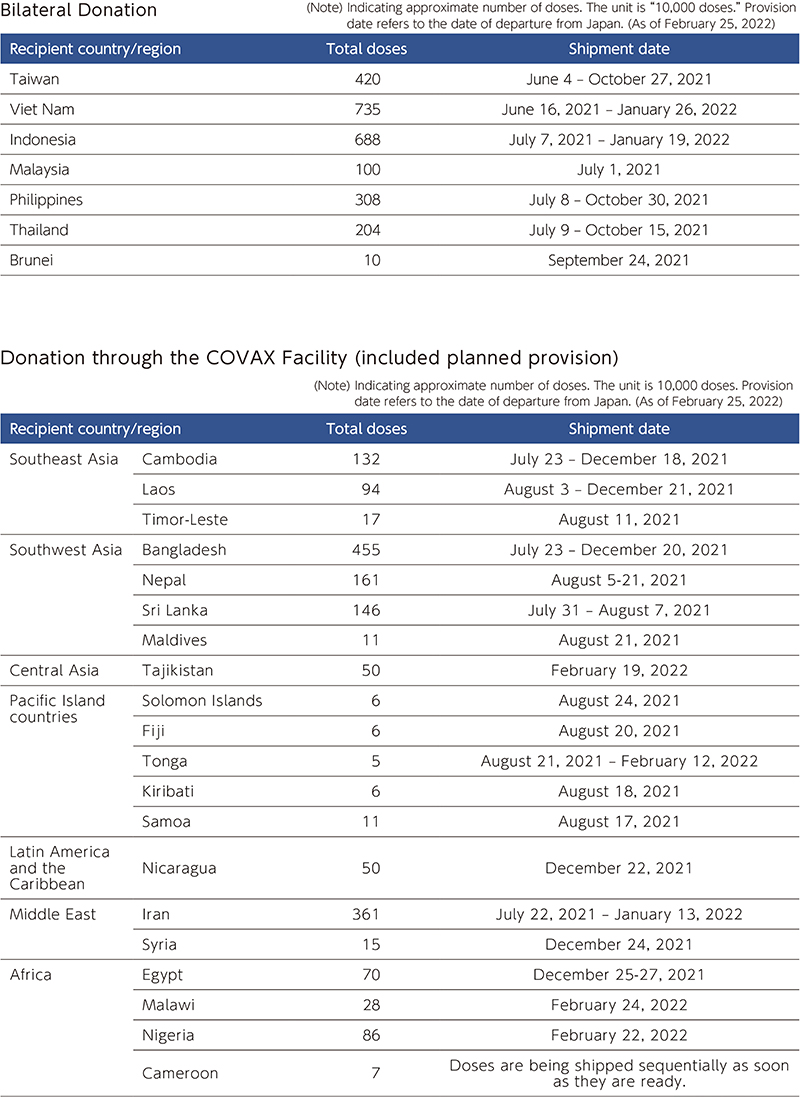
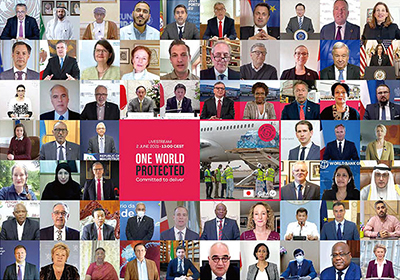 COVAX AMC Summit (June)
COVAX AMC Summit (June)- (Note 1) COVID-19 Vaccine Global Access Facility (COVAX Facility): A comprehensive financing and supply coordination mechanism to ensure equitable access to COVID-19 vaccines, including in developing countries, that is led by Gavi, the Vaccine Alliance, and operated in cooperation with the WHO, UNICEF, and the Coalition for Epidemic Preparedness Innovations (CEPI). The system enables supply of COVID-19 vaccines swiftly at an affordable price, leveraging economies of scale through guaranteeing purchase and market demand for vaccines.
- (Note 2) Gavi (the Global Alliance for Vaccines and Immunisation): A public-private partnership that supports immunizations in developing countries. It is also known as “Gavi, the Vaccine Alliance.”
https://www.gavi.org/our-alliance/about

Support for Strengthening Sustainable Health and Medical Systems of Developing Countries
Japan has offered grant aid to provide health and medical equipment such as X-ray equipment, ventilators, and PCR test equipment in order to strengthen sustainable health and medical systems of developing countries.
In addition, the Japan International Cooperation Agency (JICA) is working to strengthen the response capabilities of medical personnel and enhance medical facilities such as intensive care units (ICUs) in order to strengthen the treatment systems for critically ill COVID-19 patients in developing countries. In 2021, JICA started a technical cooperation project utilizing a remote ICU system in 10 countries, including Indonesia, Senegal, and Mexico. It connects doctors and nurses engaged in intensive care with Japanese intensive care specialists and nurses via a communication system to provide training and technical advice on intensive care. The project also advances the improvement of facilities, such as temporary ICUs, and equipment.
Furthermore, in Southeast Asia, Japan is implementing such measures as training for public health officials in ASEAN countries so that the ASEAN Centre for Public Health Emergencies and Emerging Diseases, which is planned to be established with Japan's cooperation, will function as the region's hub for combating infectious diseases.
Vaccine Dose-Donations by Japan
- Expressions of Gratitude from around the World
Equitable access to safe, effective, and quality-assured vaccines in all countries and regions is important for the global containment of COVID-19. Based on this belief, Japan provided a total of approximately 42 million vaccine doses to 26 countries and regions including Southeast Asia, Southwest Asia, Oceania, Latin America and the Caribbean, the Middle East, and Africa including through COVAX from June 2021 through the end of February 2022. In each country and region where vaccines from Japan were delivered, the arrival of vaccines and the handover ceremony were widely reported by the local media, including local TV and newspapers, and many voices of gratitude were received through social media and elsewhere.
For example, in Sri Lanka, the arrival of the vaccines from Japan at the airport and the handover ceremony held with the attendance of President Rajapaksa were covered as top stories in the major local media. In addition, many Sri Lankans expressed their gratitude through social media, including messages such as “I am very grateful for the support from the people of Japan during this difficult time,” and “Our two countries have built a wonderful relationship, and I want to contribute to a bright future for both countries.”
To Taiwan, Japan has provided six batches of vaccines for a total of 4.2 million doses. On the arrival of each batch of vaccines from Japan, a message showing gratitude for Japan's support and friendship such as “Taiwan-Japan bond” and “Taiwan-Japan friendship” was projected on Taipei 101, the landmark tower of Taiwan.
Japan's support does not stop with the provision of vaccines. By the end of December 2021, Japan had implemented “Last One Mile Support,” including the development of a cold chain system to deliver vaccines to vaccination sites and the strengthening of vaccine administration capacity, in 59 countries and regions.
For example, in Cambodia, in addition to the provision of vaccines, Japan provided vaccine storage refrigerators to healthcare centers through the United Nations International Children's Emergency Fund (UNICEF), and implemented training on cold chain equipment and vaccine inventory management for officials of the Government of Cambodia and municipalities. Many expressions of gratitude have been received from essential workers in Cambodia for this comprehensive support to strengthen vaccine administration capacity.
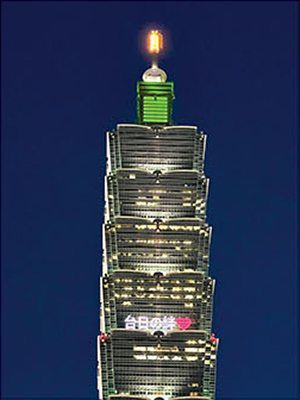 Message projected on Taipei 101 (July; Photo: Taipei 101)
Message projected on Taipei 101 (July; Photo: Taipei 101)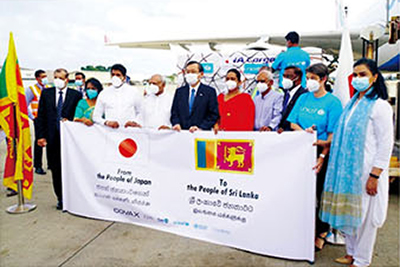 Foreign Minister Gunawardena, Minister of Health Wanniarachchi and Japanese Ambassador to Sri Lanka Sugiyama welcome the arrival of vaccines from Japan (July 31, at the airport in Sri Lanka)
Foreign Minister Gunawardena, Minister of Health Wanniarachchi and Japanese Ambassador to Sri Lanka Sugiyama welcome the arrival of vaccines from Japan (July 31, at the airport in Sri Lanka)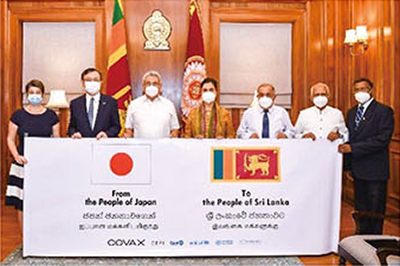 Handover ceremony held at the Presidential Secretariat of Sri Lanka (August 2)
Handover ceremony held at the Presidential Secretariat of Sri Lanka (August 2)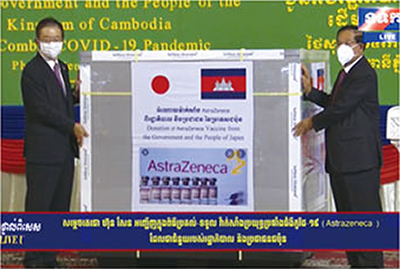 Live broadcast of the handover ceremony by Cambodian state-run television (Japanese Ambassador to Cambodia Mikami and Prime Minister Hun Sen, July 23; Photo: Cambodia's state-run TVK)
Live broadcast of the handover ceremony by Cambodian state-run television (Japanese Ambassador to Cambodia Mikami and Prime Minister Hun Sen, July 23; Photo: Cambodia's state-run TVK)Support for Maintaining, Revitalizing, and Increasing the Resilience of Economic Activities in Developing Countries
Japan is supporting the revival of economic activities in developing countries with weak economic foundations through the provision of bilateral loans and implementation of international initiatives to defer debt payments in order to help these countries maintain, revitalize, and increase the resilience of their economic activities.
Japan established the COVID-19 Crisis Response Emergency Support Loan of up to 700 billion Japanese yen over a two-year period from April 2020 to March 2022. Japan promptly provides financing needed for strengthening health systems and maintaining and revitalizing economies to developing countries. This yen loan is provided under favorable conditions for developing countries, such as a low interest rate (0.01%) and untied(Note 3) procurement conditions. The loan was provided to countries such as Papua New Guinea, Honduras, and Jordan in 2021, contributing to the maintenance and revitalization of economic activities in developing countries affected by the pandemic.
Especially in developing countries with the most vulnerable fiscal conditions, the decline in foreign direct investment and tourism, and trade transactions has caused a deterioration in the macroeconomic environment and increased the debt repayment burden in many countries. In light of these circumstances, the G20 Finance Ministers and Central Bank Governors, and the Paris Club, a group of major creditor countries, agreed to the Debt Service Suspension Initiative (DSSI) in April 2020. Public debt service dues falling between May 1 and December 31, 2020, in low-income countries were deferred. In October of the same year, there was an agreement on an extension of the applied period of the DSSI from January 1, 2021, to the end of June in the same year. Furthermore, in April 2021, it was agreed to make a final extension from July 1, 2021, until the end of December of the same year. Based on these agreements, Japan steadily implemented payment deferment measures to the target countries in 2021 while maintaining a high level of transparency.
In November 2020, the G20 Finance Ministers and Central Bank Governors and the Paris Club endorsed the “Common Framework for Debt Treatments beyond the DSSI,” recognizing that debt treatments beyond the DSSI may be required, as appropriate, depending on each country's circumstances, given the scale of the COVID-19 crisis, the significant debt vulnerabilities, and deteriorating economic outlook in many low-income countries. The Common Framework sets out that all official bilateral creditors will participate in debt treatments and implement them under common terms, and that private creditors' treatment will be at least as favorable as that provided by official creditors. Going forward, it is necessary to ensure that all creditors fully implement debt treatments in line with the “Common Framework.” As of the end of March 2022, three countries (Chad, Ethiopia, and Zambia) have applied for debt treatments under the “Common Framework” and discussions are proceeding, including with bilateral creditor countries that are not members of the Paris Club.
- (Note 3) Untied refers to aid in which the supplier of goods and services is determined through international competitive bidding. On the other hand, tied refers to aid in which the supplier is limited to donors or other conditions are attached.
Strengthening Preparedness and Response to Future Pandemics
In order to strengthen preparedness and response to future pandemics similar to the global spread of COVID-19, it is important to strengthen global health architecture, including WHO reform, and to robustly promote efforts to achieve universal health coverage (UHC), with closer collaboration between health and financial authorities of various countries.
At the G7 Cornwall Summit in June, the G7 Carbis Bay Health Declaration was issued, declaring the G7's commitment to take action to strengthen collective defenses to better prevent, detect, respond to, and recover from, future pandemics through effective multilateral action and a strengthened global health system.
In addition, at the G20 Rome Summit in October, the G20 Joint Finance-Health Task Force was launched with the aim of enhancing dialogue and global cooperation on issues relating to pandemic prevention, preparedness, and response (PPR), developing coordination arrangements between Finance and Health Ministries, and encouraging effective stewardship of resources for pandemic PPR.
Japan also contributes to discussions on strengthening the global health architecture at the WHO. In December, at its special session, the World Health Assembly unanimously decided to establish an intergovernmental negotiating body (INB) to draft and negotiate an international instrument on pandemic prevention, preparedness and response. The INB will begin the process to develop an international instrument at the WHO. At the same time, Japan will contribute to discussions on strengthening compliance with and implementation of the International Health Regulations (IHR).
Furthermore, the Government of Japan hosted the Tokyo Nutrition for Growth Summit 2021 in December 2021 and issued the Tokyo Compact on Global Nutrition for Growth, based on the principle that “Nutrition is fundamental for the health and well-being of individuals.” At the Summit, active discussions were conducted with various stakeholders in the international community to strengthen immunity through improved nutrition, to prepare for future infectious disease outbreaks, and to achieve UHC.
Japan will contribute to building a global health architecture that will contribute to health security by strengthening PPR against future public health crises, including pandemics, based on Japan's experience and knowledge.
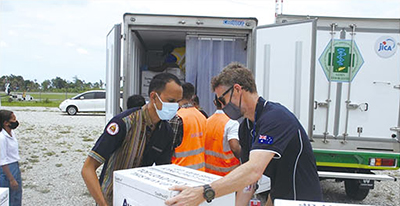 Vaccines from Australia being transported by refrigerated trucks provided to Timor-Leste by Japan (Photo: Medical and Pharmaceutical Supply Agency (SAMES))
Vaccines from Australia being transported by refrigerated trucks provided to Timor-Leste by Japan (Photo: Medical and Pharmaceutical Supply Agency (SAMES))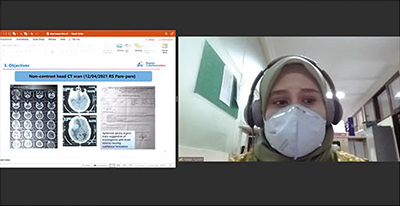 An Indonesian doctor receiving remote training from Japanese doctors (Photo: JICA)
An Indonesian doctor receiving remote training from Japanese doctors (Photo: JICA)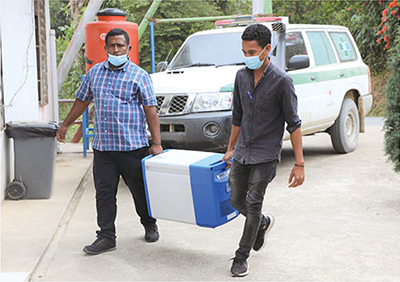 Vaccines being transported by vehicles and vaccine carriers provided to Timor-Leste by Japan (Photo: JICA)
Vaccines being transported by vehicles and vaccine carriers provided to Timor-Leste by Japan (Photo: JICA)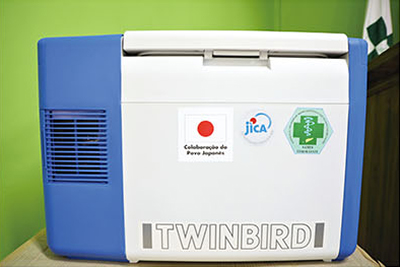 A vaccine carrier provided to Timor-Leste (Photo: JICA)
A vaccine carrier provided to Timor-Leste (Photo: JICA)